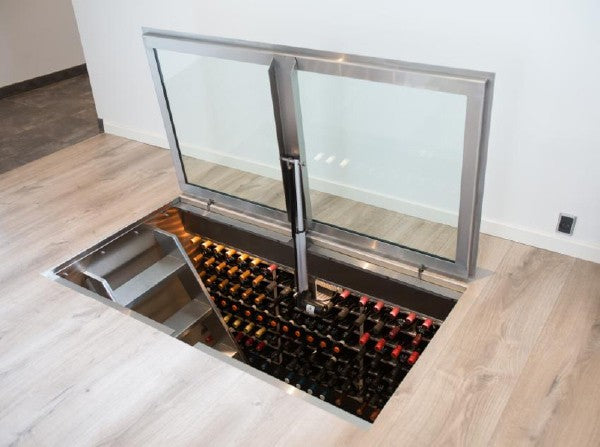Making a Profit Collecting Wine
Vinotemp Custom Commercial Wine Storage Project for Hardrock Cafe
Wine Collecting for Investment: Building a Profitable Collection
Investing in a wine collection can prove to be a fun and lucrative hobby. Similar to collecting other fine goods, it requires research, a bit of expert advice, and patience to turn a profit. Whether you are considering investing in wine as a hobby or to make money, we have some helpful tips to consider.

Glass Wine Cellar by Vinotemp
Research
Fine wines account for only 0.1% of the market. Traditionally, fine wines are made in the French regions of Rhone Valley, Burgundy, and Bordeaux, Italy, and select Californian wine from Napa and Sonoma County. Australian wines are also now being recognized for their investment potential.
Prior to investing in a bottle, conduct plenty of market research. For the most part, scarcity and exclusivity are some good indicators that a wine will appreciate in value, particularly if the winery has a longstanding reputation. For example, the Screaming Eagle winery in California released a limited run (600 bottles) of its 2010 Screaming Eagle Sauvignon Blanc for $250/bottle only to its longstanding customers. Spectrum Wine Auction recently sold a six-bottle case of the wine for $7,000. You may also find it lucrative to purchase wine en primeur, which means buying the wine after it is made but before it has been bottled. Buying wine before it is bottled is regarded as the best way to get the lowest price. Other factors that affect the value of wine include the vintage, economic conditions, and future aging potential.
When you are ready to make your first major purchase, you may find it helpful to hire a wine merchant with the knowledge and reputation to ensure the wine you are buying is authentic. You can find a list of the world’s most expensive wines and their values here.
Determine your budget for investing in wine and make sure it is one you are truly comfortable with. Other expenses will occur in addition to the buying of wine which include insurance and proper storage, which we will discuss next.
Prior to investing in a bottle, conduct plenty of market research. For the most part, scarcity and exclusivity are some good indicators that a wine will appreciate in value, particularly if the winery has a longstanding reputation. For example, the Screaming Eagle winery in California released a limited run (600 bottles) of its 2010 Screaming Eagle Sauvignon Blanc for $250/bottle only to its longstanding customers. Spectrum Wine Auction recently sold a six-bottle case of the wine for $7,000. You may also find it lucrative to purchase wine en primeur, which means buying the wine after it is made but before it has been bottled. Buying wine before it is bottled is regarded as the best way to get the lowest price. Other factors that affect the value of wine include the vintage, economic conditions, and future aging potential.
When you are ready to make your first major purchase, you may find it helpful to hire a wine merchant with the knowledge and reputation to ensure the wine you are buying is authentic. You can find a list of the world’s most expensive wines and their values here.
Determine your budget for investing in wine and make sure it is one you are truly comfortable with. Other expenses will occur in addition to the buying of wine which include insurance and proper storage, which we will discuss next.
Storage
Proper storage of your investment will ensure it ages gracefully while holding its value. Wine is ideally stored in a cool, dark, and secure space where the temperature is consistently 55◦F and 70%RH. You will require sturdy racking that can hold the bottle horizontally, keeping the cork wet. For long term storage, a wine cellar is the ideal option. A wine cabinet is another alternative when a wine cellar is not feasible. Both of these options require a powerful wine cellar cooling system that will keep your bottles in the ideal environment. Whichever storage system you choose, closely monitor the temperature and humidity. You may do this using a wireless system that alerts you by text or email. You may also opt for a home security system that will notify you if something is wrong.
Wine storage facilities are available for the cost of a monthly membership. These storage centers provide the same benefits of a wine cellar with added security. They are not as convenient, however, as having a cellar in the privacy of your home.
Be Patient
As with any investment, patience is key. You may not be able to sell your wine for five to ten years. Once you are ready to sell, the sale can be facilitated through a wine merchant or auction house who will act as a middleman between you and the buyer. Online auctions are available allowing the seller to sell their wine direct to buyers, but careful attention should be paid to each state’s liquor laws.
When it comes to investing in wine, ample research, proper storage, and patience will result in a fruitful payoff. Don’t forget, the best part of investing in wine is the option of drinking and sharing your collection for your own enjoyment.
When it comes to investing in wine, ample research, proper storage, and patience will result in a fruitful payoff. Don’t forget, the best part of investing in wine is the option of drinking and sharing your collection for your own enjoyment.




